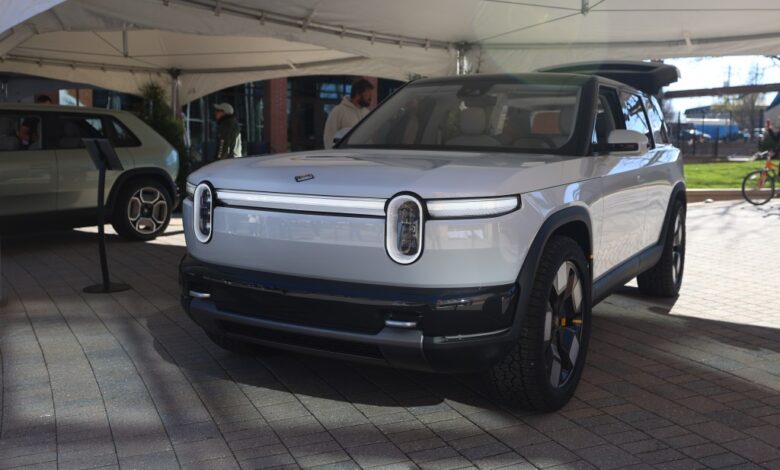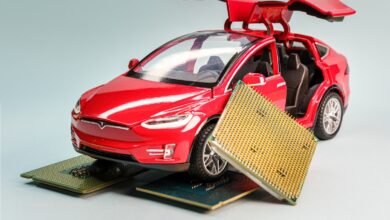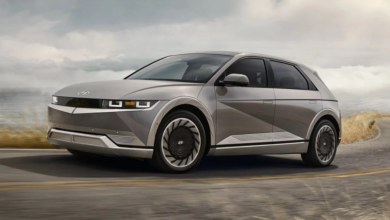Rivian to invest $1.5B and add more than 550 jobs in Normal

Rivian’s decision to launch production of its second-generation electric vehicles in Normal, rather than Georgia, will bring $1.5 billion in capital investment and hundreds of jobs to its central Illinois factory, the automaker and Gov. J.B. Pritzker announced Thursday.
Backed by $827 million in state incentives, Rivian plans to expand its 4 million-square-foot auto plant and create more than 550 assembly jobs over five years to build the midsize R2 SUV, which is expected to begin rolling off the production line in 2026.
The majority of the incentives will come from state tax credits paid out over 30 years, if Rivian meets its investment and hiring obligations.
“They’re growing now and they had the opportunity to grow in Georgia or in Illinois,” Pritzker said during a news conference at the Rivian plant. “We wanted them to stay right here and create jobs here. That was why we put an incentive package together and made that offer to Rivian.”
In March, Rivian revealed the R2 and the smaller and sportier R3 crossover, springing the news that the R2, at least initially, will be made in Illinois, putting plans to build a $5 billion Georgia plant on hold.
Rivian is expected to expedite getting the R2 to market and save more than $2.25 billion in capital expense by launching production alongside its full-sized R1 lineup in Normal, the company said.
The company received more than 68,000 preorders for the $45,000 R2 within 24 hours of its online debut.
“The support from the state will allow us to quickly bring our midsize SUV, R2, to market and provide even greater consumer choice for EVs,” Rivian CEO and founder R.J. Scaringe said in a news release.
Rivian builds its inaugural full-size electric R1T pickup truck, R1S SUV and commercial delivery vans for Amazon and AT&T in a former Mitsubishi auto plant on the outskirts of the college town about 130 miles south of Chicago.
The startup EV manufacturer was initially lured to Illinois by $4 million in local incentives and about $50 million in state tax credits over 15 years if it meets employment and investment targets at the Normal facility. Those goals included creating 1,000 jobs by 2024, a number it has long since surpassed.
The EV manufacturer currently employs 7,000 assembly workers at the Normal plant.
The new $827 million state incentive package is primarily funded through $634 million in tax credits over 30 years. The incentive agreement requires Rivian to retain at least 6,000 jobs during the entire three-decade period.
“Basically, if they don’t meet the job requirements, they don’t get the incentive,” Pritzker said.
Rivian is being transitioned from its earlier EDGE tax credit package to the newer Reimagining Energy and Vehicles in Illinois (REV Illinois) to “maximize the benefit” under the state program geared toward developing the EV industry, Kristin Richards, director of the Department of Commerce and Economic Opportunity, said Thursday.
Scaringe purchased the shuttered factory for $16 million from a liquidation firm in January 2017. Boosted by more than $1 billion in investment and expansion, the plant has built more than 100,000 EVs since starting production in 2021.
The plant was shut down for three weeks in April for retooling to streamline operations, reopening on two shifts instead of three, with all assembly line workers able to keep their jobs, albeit on different schedules.
The first major retooling since restarting the plant was designed to increase the line speed and capacity, but was not related to future production of the R2.
The expansion announcement Thursday means another round of significant construction ahead, as Rivian gears up to produce the new platform, which is expected to reach a broader potential market than the larger and pricier R1. The $1.5 billion investment will expand production capacity to 215,000 vehicles per year, with a focus on building the R2 line.
Last month, Rivian hosted an open house in the Normal town circle to give the community its first look at its second-generation EVs.
While production plans for the R3 have yet to be announced, Scaringe told the Tribune at last month’s event that the R2 and potentially R3 — which is built on the same platform — could be made in Illinois, even after the Georgia plant eventually opens.
Rivian produced 57,232 vehicles last year and its target for 2024 remains 57,000 vehicles. It produced 13,980 EVs during the first quarter, in line with expectations.
The company generated $1.3 billion in revenue and lost more than $1.5 billion in the fourth quarter of 2023, and had $7.86 billion in cash as of Dec. 31.
While Rivian’s stock traded above $100 per share after its November 2021 initial public offering, it has since fallen sharply in the wake of a slow production ramp-up and decelerating demand for EVs across the industry. On Thursday, the stock rose nearly 7% to close at $9.83 per share, representing a market cap of about $9.8 billion.
Rivian is scheduled to report its first quarter earnings Tuesday.
rchannick@chicagotribune.com



